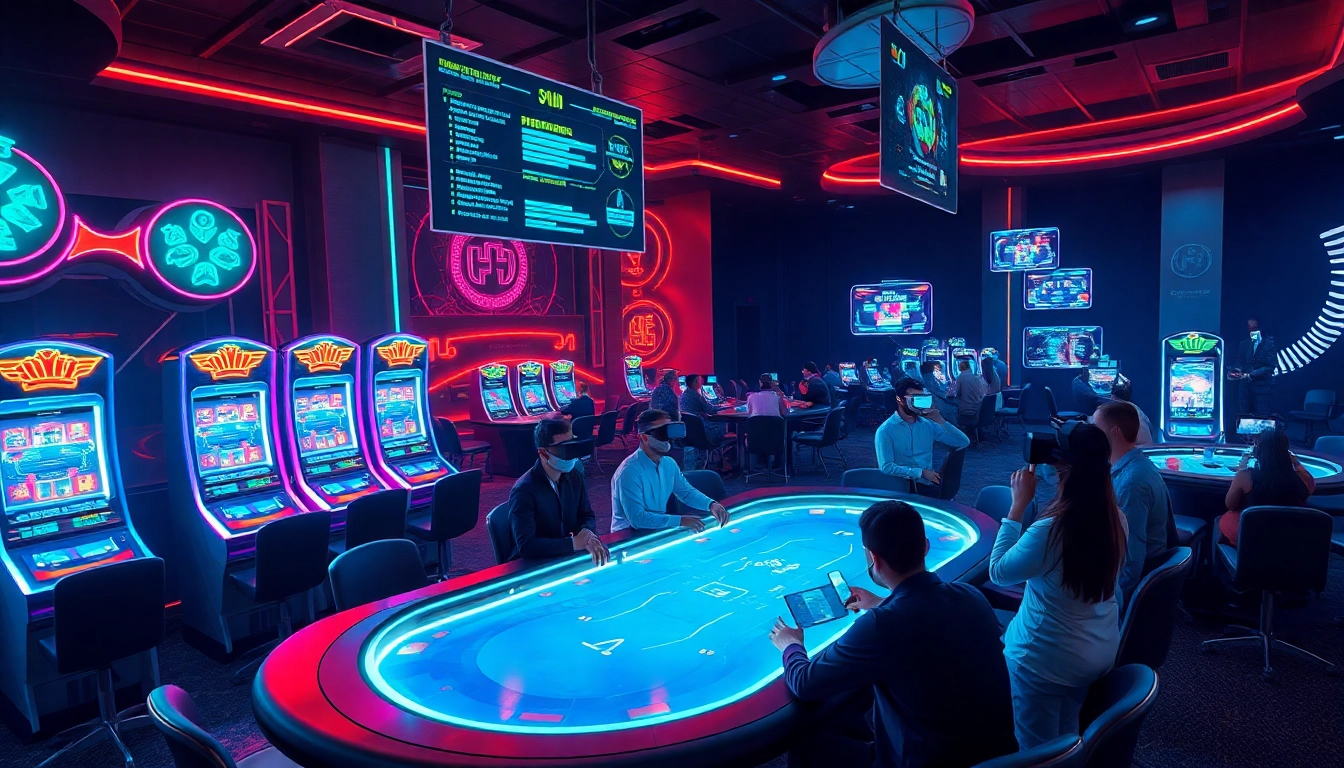Understanding New Technology in Gambling
As the landscape of gambling continues to evolve, the integration of new technology has become pivotal in shaping player experiences and operational efficiencies. Innovations in technology are transforming the traditional gambling paradigm, ushering in a new era characterized by increased user engagement, enhanced security, and novel gameplay experiences. In this section, we delve into the definitions and implications of new technologies within the casino industry.
Defining New Technology in the Casino Industry
New technology in the casino industry refers to the latest advancements that enhance the way gambling operations are conducted and how players interact with these platforms. This includes innovations in online betting, financial transactions, game development, and customer relationship management. The rise of technologies such as Artificial Intelligence (AI), blockchain, augmented reality (AR), and virtual reality (VR) are reshaping both physical and online casinos. For instance, AI algorithms can enhance game fairness and customer service by providing personalized gaming experiences and detecting fraudulent activities much faster than traditional methods.
The Impact of New Technologies on Player Experience
Through the integration of new technologies, casinos are able to create more immersive and interactive experiences for players. For example, live dealer games utilize real-time video streaming to allow players to participate in games like blackjack or roulette from the comfort of their homes while experiencing the authentic atmosphere of a brick-and-mortar casino. Moreover, gamification techniques are employed to increase player engagement by incorporating reward systems and challenges that motivate users to play longer. The social interaction elements of gaming are also amplified through these technologies, fostering a sense of community among players.
Challenges in Implementing New Technology
Despite the numerous benefits brought forth by new technologies, the implementation process is not without its challenges. One significant hurdle is the rapid pace of technological change, which often outpaces regulatory frameworks. Ensuring compliance with local laws while integrating cutting-edge technology can pose a daunting task for many operators. Additionally, the initial costs associated with adopting new technologies can deter smaller casinos from making necessary upgrades. Furthermore, there is an inherent risk of technological malfunctions, which could lead to decreased player trust and operational setbacks.
Latest Trends in Gambling Technology
The Rise of AI and Machine Learning in Online Casinos
AI and machine learning are at the forefront of technological advancements in online casinos. These technologies are utilized to analyze player behavior, optimize gaming experiences, and enhance security protocols. For instance, AI-driven analytics can personalize marketing strategies by predicting player preferences and tailoring promotions accordingly. Moreover, machine learning algorithms are essential in identifying patterns or anomalies in gambling activities, aiding in fraud detection and responsible gambling initiatives. Future advancements may see even deeper integrations of AI, including virtual dealers powered by AI and fully automated game management systems.
Blockchain and Security in Transactions
Blockchain technology is revolutionizing the security and transparency of financial transactions within the gambling sector. By utilizing decentralized ledgers, operators can ensure that all transactions are recorded securely, reducing the risk of fraud and chargebacks. This transparency also builds player trust, as they can independently verify the fairness of games and transaction histories. Cryptocurrencies, such as Bitcoin and Ethereum, are becoming an increasingly viable payment option, offering players anonymity and faster transaction processing times. Furthermore, the immutability of blockchain records serves as a strong deterrent against potential cheating and illicit activities.
Virtual Reality: Immersive Casino Experiences
The advent of virtual reality (VR) technology presents unparalleled opportunities for creating immersive gambling experiences. With VR headsets, players can step into a 3D casino environment from their homes, interacting with dealers and other players in real time. This gamification of the gambling experience adds layers of engagement that traditional platforms cannot replicate. Some casinos are already developing VR poker rooms and slot machine experiences that simulate the feeling of being in a physical casino. As hardware becomes more accessible and affordable, it is expected that VR will become a standard feature in online gambling.
The Role of Mobile Technology in Gambling
Mobile Apps: Revolutionizing Access to Gambling
Mobile technology has transformed how players engage with gambling, making it more accessible than ever. Mobile apps allow users to place bets, play games, and manage their accounts anywhere and anytime, providing unmatched convenience. The rise of responsive design has ensured that casinos can deliver a seamless gambling experience on various devices, whether through dedicated mobile apps or optimized websites. Key features such as push notifications keep players informed about promotions and loyalty rewards, significantly enhancing customer retention and satisfaction.
New Payment Technologies and E-Wallets
As online gambling grows, so does the demand for faster and more diverse payment options. E-wallets and online payment systems like PayPal, Skrill, and Neteller have risen in popularity among players due to their ease of use, security features, and instant processing capabilities. Furthermore, mobile payment solutions, including Apple Pay and Google Pay, are simplifying the transaction process for players, allowing them to fund their gambling accounts quickly without compromising security. The integration of biometric authentication can also be expected, offering enhanced safety and convenience for users.
Enhancing User Engagement through Gamification
Gamification is a powerful strategy adopted by casinos to enhance user engagement and loyalty. By incorporating gaming mechanics such as leaderboards, achievement badges, and reward points into the gambling experience, players are incentivized to spend more time on the platform. This approach also transforms monotonous aspects of gambling into enjoyable challenges, keeping players entertained and engaged. Additionally, social features that allow players to compete against friends or share wins on social media platforms contribute to a sense of community and excitement around gambling.
New Technology Regulations in Gambling
Understanding Compliance and Licensing for New Technologies
With the rapid innovation of technology in gambling, ensuring compliance with evolving regulations is critical. Regulatory bodies are tasked with providing clear guidelines that govern the use of new technologies while ensuring consumer protection and fairness in gambling practices. Operators must navigate licensing requirements for technology integration, which can vary significantly across jurisdictions. Understanding these regulations is essential for operators to implement technologies without facing hefty fines or legal repercussions.
How Regulations Affect the Implementation of Innovations
Despite the innovative potential that new technologies offer, regulatory restrictions can hamper their adoption. Striking a balance between fostering innovation and ensuring player protection is a challenging task for regulators. Some technologies, especially those reliant on cryptocurrencies or blockchain, are viewed with skepticism by regulatory authorities. Consequently, operators must invest time in educating regulators about these technologies’ benefits while advocating for reasonable regulations that do not stifle innovation.
Case Studies: Compliance Success Stories
Several operators have successfully navigated the complex landscape of technology regulations to implement innovative solutions. For example, major online casinos in regulated markets have utilized secure blockchain for transaction processing, creating a transparent and verifiable system that builds player trust. Furthermore, operators that have adopted AI for customer support have complied with data protection regulations through transparent data usage policies, ensuring player data is handled responsibly. These success stories serve as a model for others in the industry looking to innovate while maintaining compliance.
The Future of New Technology in Gambling
Predictions for New Technologies in Casinos by 2030
As the gambling industry continues to progress, several key trends are expected to shape the future landscape by 2030. The ongoing development of 5G technology will enable ultra-fast internet connections, supporting more sophisticated online gaming experiences with reduced latency. Advances in AI will likely lead to greater personalization, as algorithms evolve to understand player preferences on a deeper level. Furthermore, the integration of biometric technologies for identity verification is expected to enhance security while streamlining the player onboarding process. Additionally, concepts involving augmented reality could redefine how physical casinos are experienced, allowing a blend of digital elements within physical spaces.
Preparing for the Challenges of Emerging Technologies
To thrive in the rapidly evolving gambling environment, operators must prepare for various challenges that accompany emerging technologies. Training staff on new systems and technologies is crucial to ensure that users can leverage these innovations effectively. Challenges such as cyber threats and potential data breaches must also be addressed with robust cybersecurity measures. Furthermore, staying informed about regulatory trends and engaging with policymakers will be critical to advocating for favorable conditions that support innovation. Collaboration with technology providers can also facilitate smoother implementation and integration of new systems.
How to Stay Ahead in the Evolving Gambling Landscape
To maintain a competitive edge in the gambling industry, operators must remain agile and adaptive to change. Conducting regular market research to identify emerging technologies strengthens decision-making processes when adopting innovations. Establishing partnerships with leading tech firms can enhance access to advanced technologies while fostering collaborative product development. Moreover, prioritizing player feedback helps operators understand the evolving needs and expectations of their audience, allowing for tailored experiences that maintain customer loyalty in an increasingly crowded marketplace.









